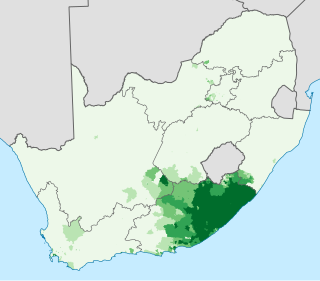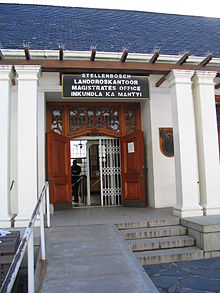A | B | C | D | E | F | G | H | CH | I | J | K | L | M | N | O | P | Q | R | S | T | U | V | W | X | Y | Z | 0 | 1 | 2 | 3 | 4 | 5 | 6 | 7 | 8 | 9
| Xhosa | |
|---|---|
| isiXhosa | |
| Pronunciation | [kǁʰóːsa] |
| Native to | South Africa Lesotho |
| Region | eastern Eastern Cape; scattered communities elsewhere |
| Ethnicity | AmaXhosa |
Native speakers | 8 million (2013)[1] 11 million L2 speakers (2002)[2] |
| Latin (Xhosa alphabet) Xhosa Braille Ditema tsa Dinoko | |
| Signed Xhosa[3] | |
| Official status | |
Official language in | |
Recognised minority language in | |
| Language codes | |
| ISO 639-1 | xh |
| ISO 639-2 | xho |
| ISO 639-3 | xho |
| Glottolog | xhos1239 |
S.41[4] | |
| Linguasphere | 99-AUT-fa incl. varieties 99-AUT-faa to 99-AUT-faj + 99-AUT-fb (isiHlubi) |
 Proportion of the South African population that speaks Xhosa at home
0–20%
20–40%
40–60%
60–80%
80–100% | |
Xhosa (/ˈkɔːsə/ KAW-sə, /ˈkoʊsə/ KOH-sə;[5][6][7] Xhosa pronunciation: [kǁʰóːsa]), formerly spelled Xosa and also known by its local name isiXhosa, is a Nguni language, indigenous to Southern Africa and one of the official languages of South Africa and Zimbabwe.[8] Xhosa is spoken as a first language by approximately 10 million people and as a second language by another 10 million, mostly in South Africa, particularly in Eastern Cape, Western Cape, Northern Cape and Gauteng, and also in parts of Zimbabwe and Lesotho.[9] It has perhaps the heaviest functional load of click consonants in a Bantu language (approximately tied with Yeyi), with one count finding that 10% of basic vocabulary items contained a click.[10]
Classification
Xhosa is part of the branch of Nguni languages, which also include Zulu, Southern Ndebele and Northern Ndebele, called the Zunda languages.[11] Zunda languages effectively form a dialect continuum of variously mutually intelligible varieties.
Xhosa is, to a large extent, mutually intelligible with Zulu and with other Nguni languages to a lesser extent. Nguni languages are, in turn, classified under the much larger abstraction of Bantu languages.[12]
Geographical distribution



Xhosa is the most widely distributed African language in South Africa, though the most commonly spoken South African language is Zulu.[12] Xhosa is the second most common Bantu home language in South Africa. As of 2003[update] approximately 5.3 million Xhosa-speakers, the majority, live in the Eastern Cape, followed by the Western Cape (approximately 1 million), Gauteng (671,045), the Free State (246,192), KwaZulu-Natal (219,826), North West (214,461), Mpumalanga (46,553), the Northern Cape (51,228), and Limpopo (14,225).[13] There is a small but significant Xhosa community of about 200,000 in Zimbabwe.[14] Also, a small community of Xhosa speakers (18,000) live in Quthing District, Lesotho.[15]
Orthography
Latin script
The Xhosa language employs 26 letters from the Latin alphabet; some of the letters have different pronunciations from English. Phonemes not represented by one of the 26 letters are written as multiple letters. Tone, stress, and vowel length are parts of the language but are generally not indicated in writing.[16]
Phonology
Vowels
Xhosa has an inventory of ten vowels: , , , and written a, e, i, o and u in order, all occurring in both long and short. The /i/ vowel is long in the penultimate syllable and short in the last syllable.[17]
| Front | Back | |||
|---|---|---|---|---|
| short | long | short | long | |
| Close | i ⟨i⟩ | iː ⟨ii⟩ | u ⟨u⟩ | uː ⟨uu⟩ |
| Mid | ɛ ⟨e⟩ | eː ⟨ee⟩ | ɔ ⟨o⟩ | oː ⟨oo⟩ |
| Open | a ⟨a⟩ | aː ⟨aa⟩ | ||
Tones
Xhosa is a tonal language with two inherent phonemic tones: low and high. Tones are rarely marked in the written language, but they can be indicated ⟨a⟩ , ⟨á⟩ , ⟨â⟩ , ⟨ä⟩ . Long vowels are phonemic but are usually not written except for ⟨â⟩ and ⟨ä⟩, which are each sequence of two vowels with different tones that are realized as long vowels with contour tones (⟨â⟩ high–low = falling, ⟨ä⟩ low–high = rising).
Consonants
Xhosa is rich in uncommon consonants. Besides pulmonic egressive sounds, which are found in all spoken languages, it has a series of ejective stops and one implosive stop.
It has 18 click consonants (in comparison, Juǀʼhoan, spoken in Botswana and Namibia, has 48, and Taa, with roughly 4,000 speakers in Botswana, has 83). There is a series of six dental clicks, represented by the letter ⟨c⟩, similar to the sound represented in English by "tut-tut" or "tsk-tsk"; a series of six alveolar lateral clicks, represented by the letter ⟨x⟩, similar to the sound used to call horses; and a series of alveolar clicks, represented by the letter ⟨q⟩, that sounds somewhat like a cork pulled from a bottle.
The following table lists the consonant phonemes of the language, with the pronunciation in IPA on the left and the orthography on the right:
- Two additional consonants, and , are found in borrowings. Both are spelled ⟨r⟩.
- Two additional consonants, and , are found in borrowings. Both are spelled ⟨zh⟩.
- Two additional consonants, dz and dz̤, are found in loans. Both are spelled ⟨dz⟩, as the sound d̥zʱ.
- An additional consonant, ŋ̈ is found in loans. It is spelled ⟨ngh⟩.
- The onset cluster /kl/ from phonologized loanwords such as ikliniki "the clinic" can be realized as a single consonant kʟ̥ʼ.
- The unwritten glottal stop is present in words like uku(ʔ)ayinela "to iron", uku(ʔ)a(ʔ)aza "to stutter", uku(ʔ)amza "to stall".
- In informal writing, this murmured consonant can sometimes be seen spelled as ⟨vh⟩ as in ukuvha, but this is non-standard.
- Sequences of /jw/ as in ukushiywa "abandonment" are phonologically realized ɥ, but this sound is non-phonemic.
In addition to the ejective affricate tʃʼ, the spelling ⟨tsh⟩ may also be used for either of the aspirated affricates tsʰ and tʃʰ.
The breathy voiced glottal fricative ɦ is sometimes spelled ⟨h⟩.
The ejectives tend to be ejective only in careful pronunciation or in salient positions and, even then, only for some speakers. Otherwise, they tend to be tenuis (plain) stops. Similarly, the tenuis (plain) clicks are often glottalised, with a long voice onset time, but that is uncommon.
The murmured clicks, plosives and affricates are only partially voiced, with the following vowel murmured for some speakers. That is, da may be pronounced dʱa̤ (or, equivalently, d̥a̤). They are better described as slack voiced than as breathy voiced. They are truly voiced only after nasals, but the oral occlusion is then very short in stops, and it usually does not occur at all in clicks. Therefore, the absolute duration of voicing is the same as in tenuis stops. (They may also be voiced between vowels in some speaking styles.) The more notable characteristic is their depressor effect on the tone of the syllable.[20]
Consonant changes with prenasalisation
editWhen consonants are prenasalised, their pronunciation and spelling may change. The murmur no longer shifts to the following vowel. Fricatives become affricated and, if voiceless, they become ejectives as well: mf is pronounced ɱp̪fʼ, ndl is pronounced ndɮ, n+hl becomes ntl ntɬʼ, n+z becomes ndz ndz, n+q becomes n͡ŋǃʼ etc. The orthographic b in mb is the voiced plosive mb. Prenasalisation occurs in several contexts, including on roots with the class 9 prefix /iN-/, for example on an adjective which is feature-matching its noun:
/iN- + ɬɛ/ → intɬɛ "beautiful" (of a class 9 word like inja "dog")
When aspirated clicks (⟨ch, xh, qh⟩) are prenasalised, the silent letter ⟨k⟩ is added (⟨nkc, nkx, nkq⟩) to prevent confusion with the nasal clicks ⟨nc, nx, nq⟩, and are actually distinct sounds. The prenasalized versions have a very short voicing at the onset which then releases in an ejective, like the prenasalized affricates, while the phonemically nasal clicks have a very long voicing through the consonant. When plain voiceless clicks (⟨c, x, q⟩) are prenasalized, they become slack voiced nasal (⟨ngc, ngx, ngq⟩).

